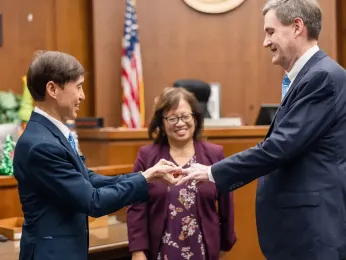
Jul 2
Political Notebook: Gay former San Mateo presiding judge Karesh leaves the bench
Matthew S. Bajko READ TIME: 7 MIN.
After celebrating his 65th birthday on June 22, Jonathan E. Karesh went back to work the next day as a San Mateo County Superior Court judge. The following day, though, he retired from the bench.
He had decided years ago he would upon reaching retirement age. Judges are eligible to do so with a full pension once they turn 65, “which is quite good,” Karesh noted.
“It doesn’t really make sense to continue working financially. Also, having done it almost 25 years, it was time to move on, as much as I love the job,” he told the Bay Area Reporter in a phone interview last month.
What he hadn’t planned for was taking on a new role as a mediator/arbitrator with Signature Resolution. The firm based in Southern California has expanded to the Bay Area and reached out to Karesh earlier this year about joining its team. He expects to start in August but doesn’t plan to work full-time.
“Most of my experience as a judge was in criminal cases. About 20% of my career was doing civil cases,” noted Karesh. “I talked to them, and they believe I still have the qualities needed to be a mediator.”
Similar to the trip he took back in 2000 when then-governor Gray Davis appointed him to the San Mateo bench, Karesh celebrated his retirement with a trip to Honolulu, Hawaii last month.
“It is one of my favorite places in the world to go to,” said Karesh.
This time, he was accompanied by his husband, Steven Tran, 65, who is also retired from his career in the semiconductor field. A refugee from Vietnam who first settled in Dallas, Texas, in the early 1980s, Tran a decade ago moved to the Bay Area where his parents and siblings had relocated to but still co-owns a nail salon in the Lone Star State.
The couple first met in the fall of 2021, ironically, via an app for older men seeking younger guys. By 2022, they were dating each other and the following year, in December, married. Their officiant was Elizabeth Lee, who also retired last month as a San Mateo County judge and co-hosted her retirement party with Karesh last Friday.
“He has the best heart of anybody I have ever dated,” said Karesh of his husband. “We have a lot of things in common. We get along great. It has been a wonderful experience.”
Speaking to the B.A.R. June 26 on the eve of cohosting the dual retirement party with Lee, Karesh was still processing being a retired judge.
“It really hasn’t sunk in, yet. I have been focusing on the party tomorrow night,” said Karesh, who was also hosting friends from Florida in town for the occasion. “It does feel a little odd not to go into work every day, which I have been doing at 9 a.m. every weekday for the last 24 and half years.”
His now being a retired judge comes as attacks on the country’s judiciary are frequently being voiced by Republican President Donald Trump and other GOP officials. While their focus of late has been on federal judges, state judges are not immune from such criticisms.
Karesh pointed to the bomb attack last year at a Southern California courthouse in Santa Maria in which several people were injured as one reason why he is concerned about the attacks being inveighed against judges just for doing their jobs.
“I think our state court system is exceptional. What they need to realize is judges are doing the best they can to make rulings based on the law; that doesn’t always work in somebody’s favor. In some sense, there is a winner and a loser every time when a judge makes a ruling,” noted Karesh. “People need to realize that and not take it personally.”
He followed in the judicial footsteps of his late father, Joseph Karesh, who was elected to the San Francisco Superior Court in 1960 – the year Jonathan was born – and became presiding judge of the local bench in 1973. The family lived in San Francisco's foggy Park Merced neighborhood not far from the Pacific Ocean.
Karesh’s father died in 1996, while his mother died in 2018. Karesh's older sister, Barbara, lives in Concord with her wife, Joy Accosta; in 2008, he married the women who had first met in 1979.
A UC Berkeley graduate with a degree in U.S. history, Karesh earned his law degree in 1995 at the UC Berkeley School of Law. A San Mateo resident, Karesh had worked as a San Mateo County deputy district attorney for nearly 13 years before becoming a judge.
In 2019, he became the presiding judge of the San Mateo County Superior Court. As the B.A.R. had noted, Karesh is believed to be only the second out LGBTQ judge in the county to hold the leadership position. Lesbian retired judge Rosemary Pfeiffer was the first to do so in 2000, 12 years prior to her stepping down from the bench.
When he began his two-year term, Karesh at the time was the only LGBTQ presiding judge of a county court system in California. His tenure coincided with the start of the COVID epidemic in 2020, which upended the workings of his courthouse and all others across the Golden State.
To ensure his court could still conduct jury trials, Karesh moved the proceedings to the cavernous halls used by the San Mateo County Fair. The large spaces allowed for upwards of 80 prospective jurors to gather together safely distanced 6 feet from one another.
“We had to innovate and be careful people weren’t being exposed to COVID,” recalled Karesh. “We had makeshift courtrooms at the fairgrounds.”
Eventually, they moved jury trials to the courthouse in Redwood City. They had the jurors sit in the gallery of the courtrooms so they could be 6 feet apart during the proceedings in order to follow the safety protocols called for by health officials.
“It worked out really well,” recalled Karesh. “San Mateo never had much of a COVID backlog with court cases, and I am really proud we were able to do that.”
He credited his fellow judges and the court staff for assisting him in making that possible during his time as the presiding judge. Looking back on that period of his career, Karesh told the B.A.R. it was the most stressful span of his time working in the judicial system and not one he would want to repeat.
“The COVID pandemic was the most challenging thing I had ever faced in my entire legal career, going back to being a lawyer,” noted Karesh. “I am really proud of the fact I helped lead the court through a worldwide and country-wide pandemic as well. There were so many issues we had to deal with.”
One of his most high-profile cases he handled occurred during the early years of the health crisis, that of one of the gang members involved in the 2019 shooting between two rival sides at the Tanforan Shopping Center in San Bruno. It resulted in a San Francisco man found guilty of attempted murder by a jury in 2021.
It was the one case he oversaw as a judge, noted Karesh, that made national news.
“Currently, it’s on appeal, so we will see what happens,” he said.
Until his departure from the bench, there had been three LGBTQ judges in San Mateo County; Karesh publicly came out of the closet in 2006. His former colleagues are not fully out of the closet, noted Karesh. At least one is a lesbian, according to the latest demographic data about the makeup of the state's courts.
The data released earlier this year also listed one gay judge on the San Mateo bench as of January 1, with one person not answering the question about their sexual orientation and gender identity. Twenty-three judges in the county identified as heterosexual.
It will be up to Governor Gavin Newsom (D) to appoint people to fill the vacancies created by both Lee and Karesh’s retirements. It remains to be seen if he will select an LGBTQ appointee for either seat.
Since becoming governor in 2019 through December 31, 2024, Newsom appointed 47 LGBTQ judges. Having served on the governor’s Judicial Selection Advisory Committee from 2019 through 2023, Karesh told the B.A.R. he believes Newsom has continued to help diversify the state’s judiciary in terms of LGBTQ representation, similar to his predecessor Jerry Brown.
As of the end of 2024, the official court demographics counted 89 LGBTQ judges on the state bench. Based on a list kept by the B.A.R., there were at least 94 as of the start of 2025.
“I think that Governor Newsom, and Governor Brown before him, were very cognizant of appointing LGBT people,” said Karesh. “There is always room for more.”
At the same time, Karesh said seeing LGBTQ people be named a judge is no longer as big a deal as it was when he started out in the legal profession. When he came out, he noted his colleagues took it in stride and, not once, was he discriminated against for being gay.
“Being an LGBT judge is not that noteworthy these days in a lot of ways,” said Karesh.
As for the advice he would give anyone wanting to apply for a gubernatorial judicial appointment, Karesh said having broad-based litigation experience is important. So is having people from the community, as well as judges, elected officials, and attorneys, willing to write to the governor and vouch for you, added Karesh.
“The governor appreciates hearing from people he knows who can recommend somebody,” said Karesh, though he stressed that, “You can have all the community support in world, but if you are not a really good lawyer and not really well qualified to be a judge, you are not going to get appointed.”
Political Notes, the notebook's online companion, is on hiatus until Monday, July 14.
Keep abreast of the latest LGBTQ political news by following the Political Notebook on Threads @ https://www.threads.net/@matthewbajko and on Bluesky @ https://bsky.app/profile/politicalnotes.bsky.social.
Got a tip on LGBTQ politics? Call Matthew S. Bajko at (415) 829-8836 or email [email protected] .

